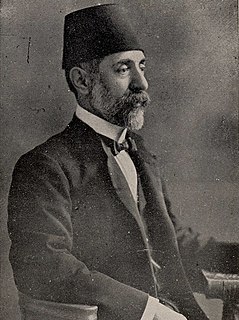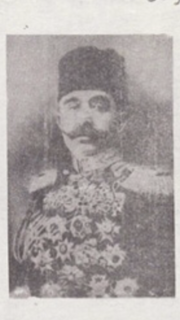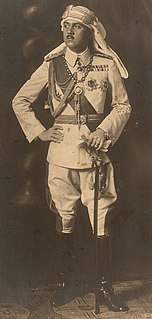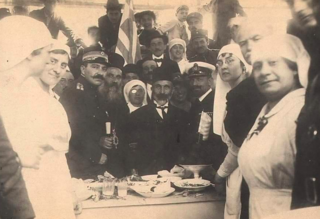
The Kurds, are an Iranian ethnic group in the Middle East. They have historically inhabited the mountainous areas to the south of Lake Van and Lake Urmia, a geographical area collectively referred to as Kurdistan. Most Kurds speak Northern Kurdish (Kurmanji) or Sorani, which both belong to the Kurdish languages.

The Kingdom of Kurdistan was a short-lived Kurdish state proclaimed in the city of Sulaymaniyah following the collapse of the Ottoman Empire. Officially, the territory involved was under the jurisdiction of the British Mandate of Mesopotamia.

The Republic of Ararat, or Kurdish Republic of Ararat, was a self-proclaimed Kurdish state. It was located in eastern Turkey, centred on Karaköse Province. "Agirî" is the Kurdish name for Ararat.

Turkish Kurdistan or Northern Kurdistan refers to the southeastern part of Turkey, where Kurds form the predominant ethnic group. The Kurdish Institute of Paris estimates that there are 20 million Kurds living in Turkey, the majority of them in the southeast.

Soran Emirate was a medieval Kurdish emirate established before the conquest of Kurdistan by Ottoman Empire in 1514 and later revived by Emir Kor centered in Rawandiz from 1816 to 1836. Kor was ousted in an offensive by the Ottomans.

Salih Hulusi Pasha, known as Salih Hulusi Kezrak after the Turkish Surname Law of 1934, was one of the last Grand Viziers of the Ottoman Empire, under the reign of the last Ottoman Sultan Mehmed VI, between 8 March 1920 and 2 April 1920. Since he had been unable to form a government, and as part of the chain of events following the occupation of Istanbul by the Allies, he was dismissed from office by the sultan under foreign pressure on 2 April. His dismissal was to be followed by the official closure of the Parliament itself on 5 April, thus putting an end to the Second Constitutional Era of the Ottoman Empire.

Mehmet Şerif Pasha, a founding member of Kurd Society for Cooperation and Progress and representative of the Society for the Elevation of Kurdistan to the Paris Peace Conference (1919–1920). He was a leading Kurdish nationalist.

Osman Fuad was an Ottoman prince, the son of Şehzade Mehmed Selaheddin, and the grandson of Sultan Murad V. He was the 39th Head of the Imperial House of Osman from 1954 to 1973.

The Sheikh Said Rebellion or Genç Incident was a Kurdish nationalist rebellion in Turkish Kurdistan in 1925 led by Sheikh Said and with support of the Civata Xweseriya Kurd against the newly-founded Turkish Republic. The rebellion was mostly led by Zaza speakers, but also gained support among some of the neighboring Kurmanji speaking Kurds in the region.

Kurdish nationalism, is a nationalist political movement which asserts that Kurds are a nation and espouses the creation of a sovereign Kurdistan state, in opposition to the various nationalisms of the states to which Kurds are live.
Muhammed Amin Zaki Bey,, was a Kurdish writer, historian and politician. He was born in Sulaimaniya, son of Hagi Abdul Rahman. After studying in Sulaimaniya Military School and Baghdad Military High School, on 10 February 1902, he graduated from the Ottoman Military Academy as the 23rd of the class and joined the Ottoman Army as Infantry Second Lieutenant. He graduated from the Ottoman Military College at Istanbul as distinguished officer on 11 January 1905. And then he served as a staff officer (major) in the Ottoman Army. He left his last duty at the Military history department on 23 July 1923 for Baghdad, and started to give lecture at the Iraqi Military Academy. He also served in the Iraqi administration under the British mandate in the 1920s and was appointed as Defence Minister in 1928. His two-volume book on history of the Kurdish people and states is one of the acclaimed works on this subject and has been translated into several languages including Arabic and English. He was the president of the Chamber of Deputies from December 1944 to June 1946. He died in Sulaimaniyah in July 1948.

The Ararat rebellion, also known as the Ağrı rebellion, was a 1930 uprising of the Kurds of Ağrı Province, in eastern Turkey, against the Turkish government. The leader of the guerrilla forces during the rebellion was Ihsan Nuri of the Jibran tribe.
Yazidis or Yezidis are a Kurmanji-speaking endogamous minority group who are indigenous to Kurdistan, a geographical region in Western Asia that includes parts of Iraq, Syria, Turkey and Iran. The majority of Yazidis remaining in the Middle East today live in Iraq, primarily in the governorates of Nineveh and Duhok. There is a disagreement among scholars and in Yazidi circles on whether the Yazidi people are a distinct ethnoreligious group or a religious sub-group of the Kurds, an Iranic ethnic group. Yazidism is the ethnic religion of the Yazidi people and is monotheistic in nature, having roots in a pre-Zoroastrian Iranic faith.
Society for the Rise of Kurdistan also known as the Society for the Advancement of Kurdistan (SAK), was secretly established in Constantinople on 6 November 1917 and officially announced organization formed on the 17 December 1918. It was headquartered in Istanbul, with the aim of creating an independent Kurdish state in eastern Turkey. The Society based its statements for an independent or autonomous Kurdistan on the Treaty of Sèvres and the Fourteen Points stipulated by Woodrow Wilson. The society formed many local dependencies in the eastern provinces of Turkey.
Ibrahim Heski or Ibrahim Pasha Haski Tello, was a Kurdish soldier, politician and president of the Kurdish Republic of Ararat. He was from the Jalali tribe.
A series of massacres in Hakkari in the years 1843 and 1846 of Assyrians were carried out by the Kurdish emirs of Bohtan and Hakkari, Bedr Khan Bey, Nurullah. The massacres resulted in the killing of more than 10,000 Assyrians and the captivity of thousands of others.
The Arab Belt was the Syrian Baath government's project of Arabization of the north of the Al-Hasakah Governorate to change its ethnic composition of the population in favor of Arabs to the detriment of other ethnic groups, particularly Kurds. It involved the seizure of land which was then settled with Arabs displaced by the creation of Lake Assad. The process is meant to re-arabize lands that were once Arab majority, before Kurdish influx into the region after the collapse of the Ottoman empire in the 1920s.

During World War I, several Kurdish rebellions took place within the Ottoman Empire.

Miralay Halid Beg Cibran was a Kurdish soldier in the Ottoman and Turkish army and chairman of the Azadî organization.

Kurd Ahmet Izzet Pasha, an Ottoman Kurd, governor and minister, was the son of Husein Pasha, half brother of Said Pasha Kurd and uncle of Şerif Pasha and Kurd Fuad Pasha.













